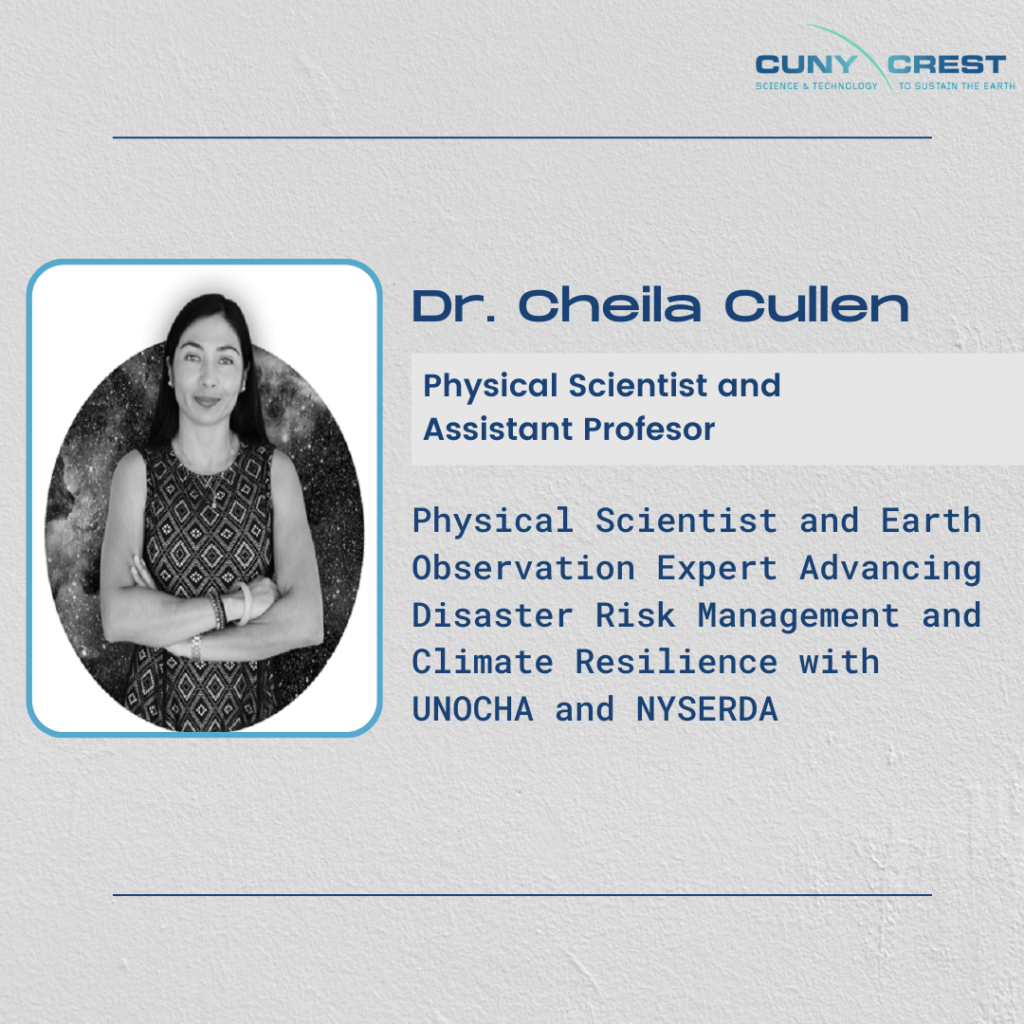Dr. Cullen: Physical Scientist and Earth Observation Expert Advancing Disaster Risk Management and Climate Resilience with UNOCHA and NYSERDA
Dr. Cullen: Physical Scientist and Earth Observation Expert Advancing Disaster Risk Management and Climate Resilience with UNOCHA and NYSERDA
Dr. Cullen is a Physical Scientist and Assistant Professor in the Department of Chemistry, Earth, and Environmental Sciences at Bronx Community College (BCC) with a joint appointment at the Department of Earth and Environmental Sciences at the CUNY Graduate Center. Dr. Cullen uses Earth Observation (EO) technologies to deliver scientific analysis and guidance to reduce risk, implement sustainable practices, and achieve resilience. She has worked with NOAA, NASA, and other national and international partners to model natural hazard risks (wildfire, landslide, and flooding), inform decision-makers at various levels, and help design disaster risk management (DRR) frameworks for national governments.
In 2020, Dr. Cullen was nominated by the Group of Earth Observations (GEO) Principal of the United States Government to serve as deputy co-chair for Subgroup 3 at the GEO Secretariat. GEO is a collaboration between more than 100 governments and over 100 Participant Organizations that seeks to create a future where decisions and actions for humanity are based on coordinated, comprehensive, and sustained Earth Observations (EO). At GEO, Dr. Cullen leads the efforts to produce policy briefs and peer-reviewed scientific publications on using EO to manage various types of natural hazards. These knowledge products are available in a one-stop hub hosted by the United Nations Office for Disaster Risk Reduction (UNDRR).
Through this work, Dr. Cullen was recently interviewed by the United Nations Office for the Coordination of Humanitarian Affairs (UNOCHA) for the 2022 report on How Earth Observations Can Enable Anticipatory Actions in Humanitarian Crisis. UNOCHA is responsible for coordinating the global humanitarian response to crises and disasters. With this report, UNOCHA outlines how EO data can provide valuable insights for anticipatory action in remote areas with limited local data collection; it can complement local understanding of the multifaceted human impact of climate disasters; and, in conjunction with other data, it can help distribute targeted aid.
In a more local context, on July 18, 2019, The Climate Leadership and Community Protection Act (Climate Act) was signed into law making New York State’s climate laws among the most ambitious in the nation. The law requires aggressive reductions in greenhouse gas emissions across the economy and created the Climate Action Council (CAC) to develop a plan to meet these targets and move New York towards carbon neutrality.
Dr. Cullen is one of 9 experts serving on one of the Technical Working Groups (TWG) for the 2023 New York State Climate Impacts Assessment, a collaborative project that aims to analyze the effects of climate change on New York State’s communities, ecosystems, and economy. The assessment is sponsored by the New York State Energy Research and Development Authority (NYSERDA) focusing on the science of climate change projections, the potential impacts on New York, and strategies for adaptation and resilience. The goal is to provide information that decision-makers at all levels can use to make informed choices about the future. Even though the assessment’s timeline does not align with the faster-moving Climate Act, the resulting information may form the scientific foundation for future recommendations or iterations of the Climate Act.




